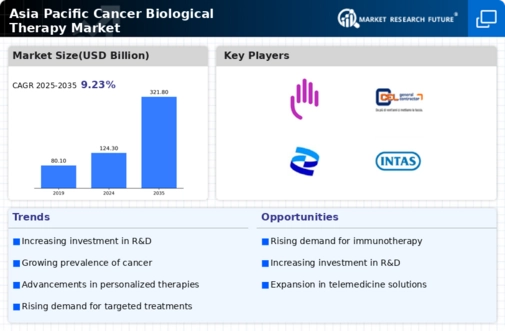Market Share
APAC Cancer Biological Therapy Market Share Analysis
A swiftly changing and progressively growing sector, the Cancer Biological Therapy Market is driven by novel ways of combating one of the most difficult health problems in the world. In this field, firms employ various tactics for capturing market share to stay competitive and address cancer effectively. One common way is differentiation through research and development where companies invest immensely on new therapies. These types of enterprises strive to be different from their rivals as they concentrate on developing new biological agents that will provide curative solutions.
Another strategy for positioning oneself in the market involves strategic alliances or collaborations. Because biological therapies are complex and require interdisciplinary knowledge, often companies partner with research institutions, academic centers and sometimes other pharmaceutical corporations. It results in knowledge sharing, pooling resources and expertise from different areas enhancing broader access to research skills. Therefore, businesses can rely on each other’s competences thereby accelerating development and commercialization of biological therapies thereby strengthening their positions in a given market.
Pricing strategies are also employed by players in Cancer Biological Therapy Market to gain a larger portion of the market. Though it might be difficult finding a balance between pricing (owing to high costs associated with research & development, manufacturing & regulatory compliance), it is imperative that such treatments be positioned strategically. There are some who adopt premium prices due to unique attributes attached to their therapies’ effectiveness. Other firms take a more affordable approach targeting patients with economic constraints in some regions who may demand lower prices.
Equally significant penetration approaches assist setting up strong presence in Cancer Biological Therapy Market. Organizations may focus on expanding their product reach into new geographies or addressing certain patient groups only. This allows organizations that manufacture drugs to position themselves as leaders within particular niche markets focusing on specific genetic profiles or cancer types hence being highly responsive towards patients’ needs as well as healthcare providers.
In fact personalized medicine has been one of the key strategies which companies use to gain market shares at present in dynamic cancer treatment industry . They study the genetic and molecular profiles of different cancers, and then develop targeted therapies. By doing this, the right treatment is provided to each individual and consequently offering better less invasive solutions compared to other companies in the same market.
For market share positioning strategies in the Cancer Biological Therapy Market, effective marketing and educational campaigns are essential. It is crucial to create awareness among medical practitioners, patients as well as ordinary people concerning biological therapy benefits and developments. Companies invest their time in explaining how their drugs work, highlighting cases where they have proved efficacious, allaying fears and apprehensions so that gradually they build goodwill (reputation) making them capture a major portion of the market.







Leave a Comment